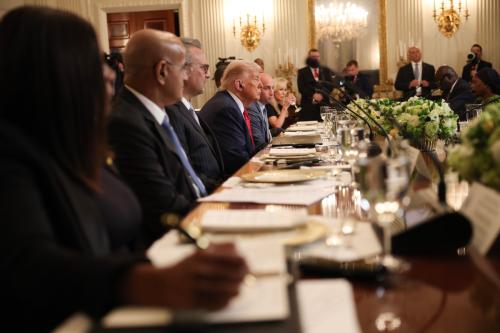I ended up in international security somewhat by accident. As an undergraduate at Stanford, I always thought I would go to law school and work as a legal advocate on domestic concerns—poverty and inequality, race issues or workforce development.
But then I went to Oxford on a Rhodes scholarship – which provided me an interesting opportunity to study something new: international affairs, from the perspective of a foreign country. And so I did my Master’s in International Relations and became quite taken by the importance and complexity of the issues.
But then I had to decide whether to go to law school (as I had originally planned) or to continue at Oxford and turn my Master’s degree into a doctoral degree. And I had a very interesting conversation with somebody who had quite an impact on me, Congresswoman Eleanor Holmes Norton, who at the time was a professor of law at Georgetown University. I was sort of laying out this dilemma to her and she said—and I guess I was 23 at the time—”How long will it take you to get your doctorate?” I said: “Probably about another two to three years.” She said, “You’ll be 25 or 26 when you’re done.” And I said, “Yeah.” She replied: “Well, if after that you still want to go to law school, you’re not going to be too old.” True, I hadn’t thought about it that way. Then, she said something like: “African-American lawyers are pretty much a dime a dozen. But very few African-Americans have gone into the field of international relations. So if you are interested in it, if your heart’s in it, why not get that degree?” I thought that made a huge amount of sense and it was also was very consistent with my gut.
So I did my doctoral thesis on the transition of Rhodesia to Zimbabwe between 1979 and 1980. It was a case study of peacekeeping and conflict resolution as conducted not by the UN or the US, but by the Commonwealth. It was a unique opportunity to write a living history, because so many of the crucial players were still alive and, yet, had sufficient distance from the events to be willing to talk about them candidly.
After I left Oxford, I went to McKinsey and Company, the management consulting firm, working in Canada. That was a great experience, which I highly recommend. But in between my Master’s and Doctorate, I had taken off about 6 months—this was in 1988—and worked on the Democratic presidential campaign as a junior foreign policy aide. Four years later, when I was up in Canada working as a consultant, President Clinton was elected. A number of the people I had been fortunate enough to work with in ’88 found me up in Canada as they began to think about people to staff the new administration. And so, to make a long story short, I was offered a job on the National Security Council (NSC) staff as Director for International Organizations and Peacekeeping responsible for UN issues and conflict resolution, which allowed me to draw on some of what I learned in writing my dissertation. So at 28, I was a staffer at the White House at the NSC.
The Brookings Institution is committed to quality, independence, and impact.
We are supported by a diverse array of funders. In line with our values and policies, each Brookings publication represents the sole views of its author(s).



Commentary
International Relations: Dangerously Lacking in Diversity
December 14, 2005